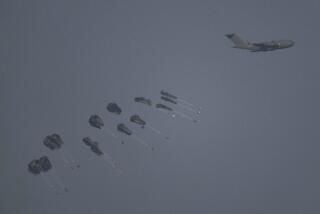U.N. body backs Gaza war report
In a vote likely to complicate U.S. efforts to revive Middle East peace talks, the United Nations Human Rights Council on Friday endorsed a report calling on Israel and Hamas to conduct credible investigations of alleged war crimes by their forces or face further international inquiries and possible prosecutions.
The action in Geneva by the 47-nation council was a sharp setback for Israel, which had labored to discredit the month-old U.N. report. The council’s vote could force Israel to defend itself for months or perhaps years -- in diplomatic forums, if not criminal tribunals -- as U.N. bodies grapple with highly charged fallout from last winter’s conflict in the Hamas-ruled Gaza Strip.
Although the council embraced a report that condemned both sides, the resolution itself criticized only Israel and was adopted by a wide margin.
For the Obama administration, the decision represents a new obstacle to its goal of negotiations to establish a Palestinian state. Israeli Prime Minister Benjamin Netanyahu had warned that an international stamp of approval for the war crimes allegations would prevent Israel from “taking risks” to reach a statehood accord. And the U.S.-backed Palestinian leadership in the West Bank, after first accepting that argument under U.S. pressure, reversed its stand and pushed for Friday’s vote.
With only the United States and five European allies objecting, the council, dominated by developing nations, fully endorsed the findings and recommendations of an expert panel led by South African jurist Richard Goldstone that investigated the Gaza conflict.
Twenty-five nations, including Russia and China, voted for the resolution promoted by Arab members, and 16 nations abstained or did not vote. Egyptian Ambassador Hisham Badr, a key supporter, told the council that it “cannot turn a blind eye to the deteriorating human rights situation in the occupied Palestinian territories.”
State Department spokesman Ian Kelly said the United States voted against the measure out of concern “that it will exacerbate polarization and divisiveness” and undermine special U.S. envoy George J. Mitchell’s work to restart peace talks broken off in December.
“What’s distressing us,” Kelly said Friday, “is that we’re losing focus on this ultimate goal, which is a lasting peace between the Israelis and the Palestinians.”
A spokesman for Mahmoud Abbas, president of the West Bank-based Palestinian Authority, called for the U.N. report’s full implementation “to translate words into deeds” and “protect our people in the future from any form of aggression.”
Israel’s Foreign Ministry said the council’s decision “provides encouragement for terrorist organizations worldwide” by condemning one state’s efforts to defend itself against a militant group.
The Goldstone panel said Israel used disproportionate force, deliberately targeted civilians and destroyed civilian infrastructure. It accused the Islamic militant group Hamas of deliberately targeting Israeli civilians with years of cross-border rocket fire leading up to Israel’s 22-day offensive, which left 13 Israelis and nearly 1,400 Palestinians dead.
The report urged the U.N. Security Council to require both sides to show within six months that they are conducting impartial investigations; failing that, it said, the Security Council should refer the allegations to prosecutors at the International Criminal Court based in The Hague.
The resolution adopted Friday will not necessarily lead to war crimes trials. Rather than call for Security Council action, it urged debate in the U.N. General Assembly, which lacks authority to refer cases to The Hague, and asked U.N. Secretary-General Ban Ki-moon to report on whether Israel was heeding the report. A U.N. spokeswoman, Michele Montas, said Ban was studying the resolution and would “do whatever is asked of us.”
Israeli officials worry that U.N. debates and inquiries will further isolate the Jewish state and encourage private lawsuits against Israeli officials and soldiers in countries that accept jurisdiction for war crimes beyond their borders. Last month, British activists tried, but failed, to get a British court to order Israeli Defense Minister Ehud Barak’s arrest during his visit to London.
The Israelis have rejected the U.N. report’s recommendation for a special inquiry on their conduct in Gaza. They argue that Israel has an independent judiciary that can review any outcome of the military’s ongoing investigations of 23 cases involving civilian deaths. Some Israeli officials have called for an independent review by Aharon Barak, the former head of the nation’s Supreme Court, but that idea has failed to gain traction.
While welcoming Friday’s vote and calling for trials of Israelis, Hamas said it would investigate the U.N. allegations against it. The United States and European Union, along with Israel, brand Hamas a terrorist organization and give no credence to that promise.
Israeli officials said they were powerless to stop the resolution. But even their lobbying for solid Western opposition fell short when Britain and France chose not to take part in the vote.
British Foreign Secretary David Miliband told the BBC that Britain and France sat out because it would upset efforts to restart peace talks and persuade Israel to end its crippling blockade of Gaza. But delegates from both countries in Geneva said they took the war crimes allegations seriously.
--
tina.susman@latimes.com
More to Read
Start your day right
Sign up for Essential California for news, features and recommendations from the L.A. Times and beyond in your inbox six days a week.
You may occasionally receive promotional content from the Los Angeles Times.







